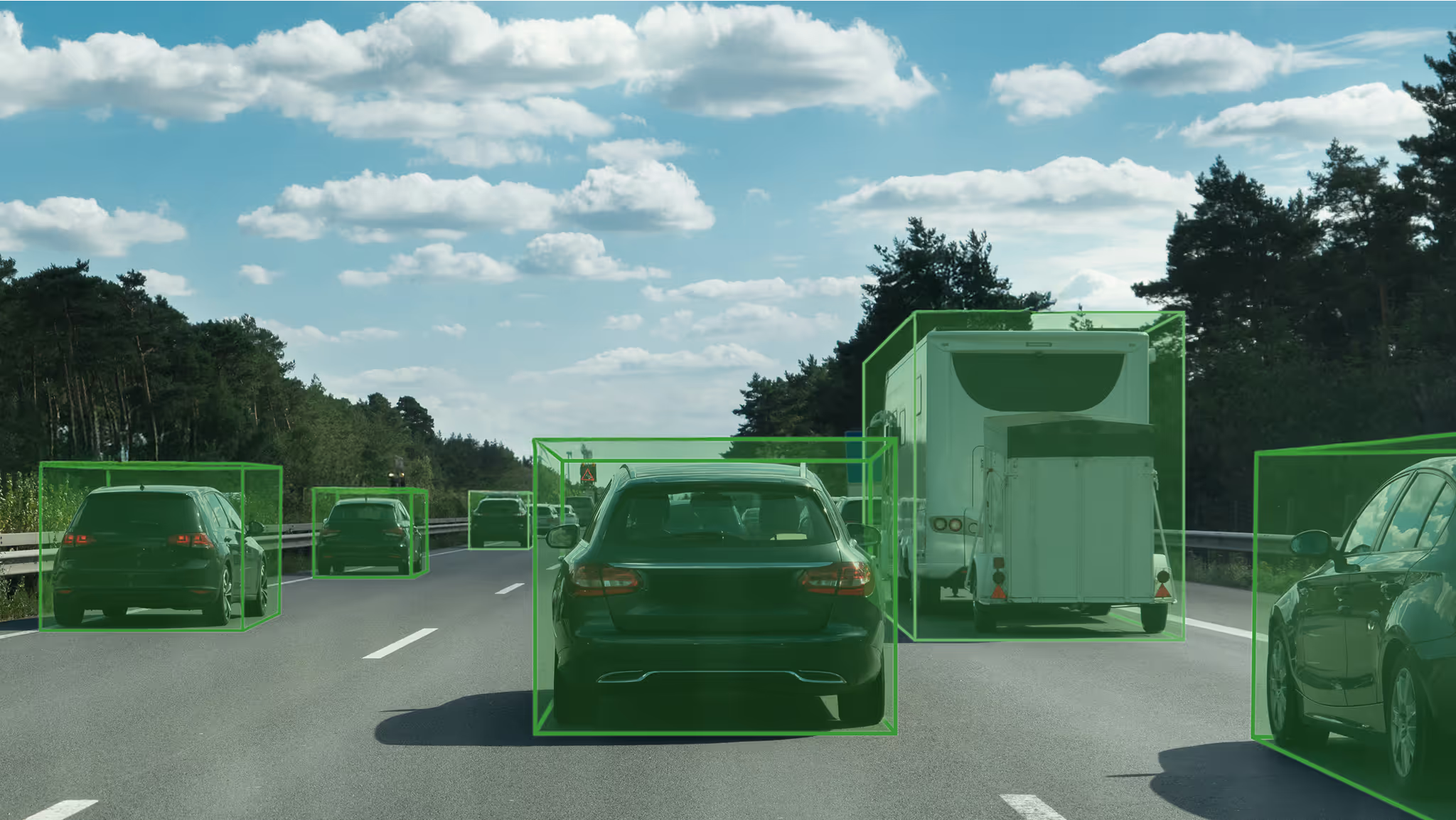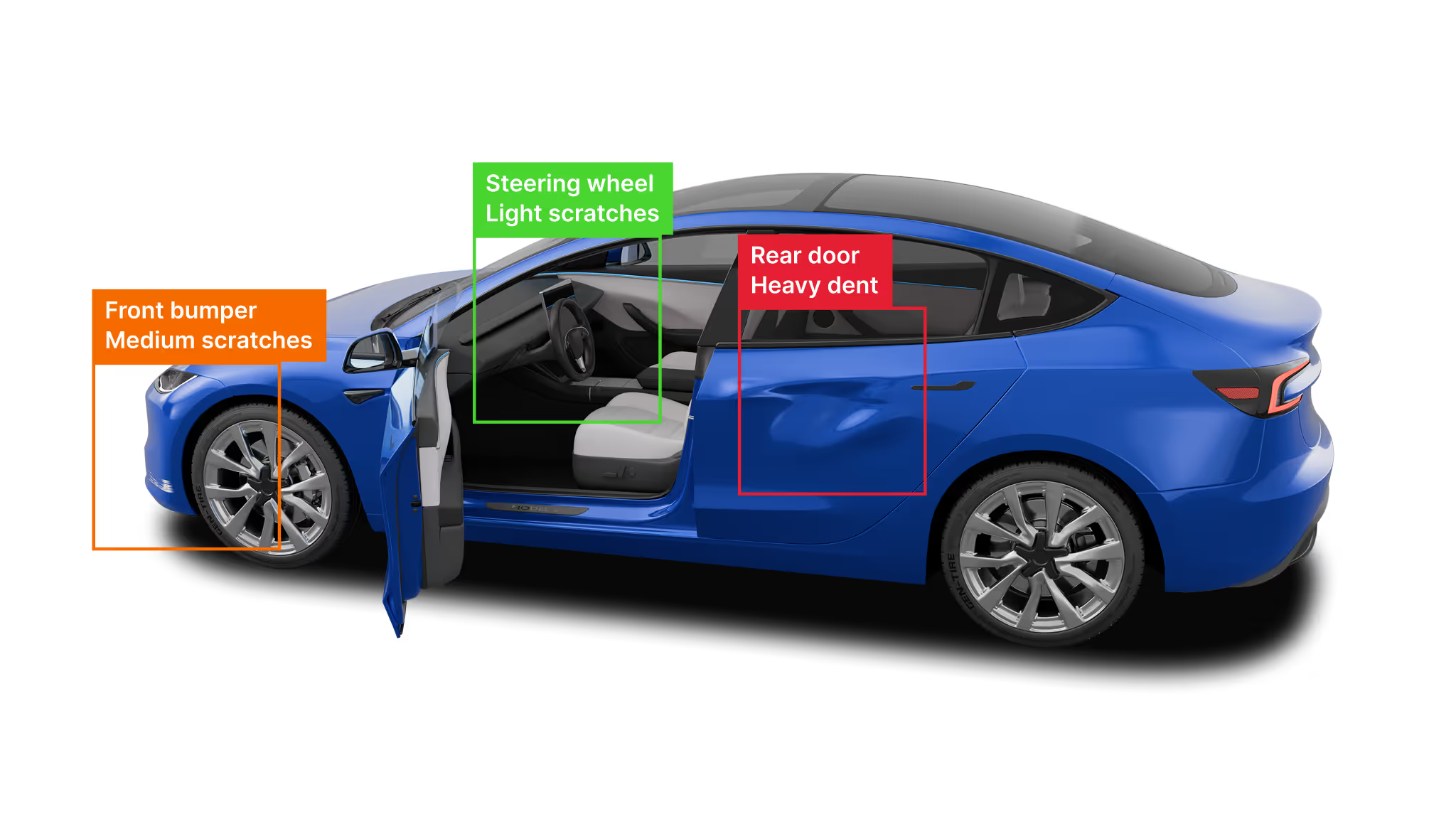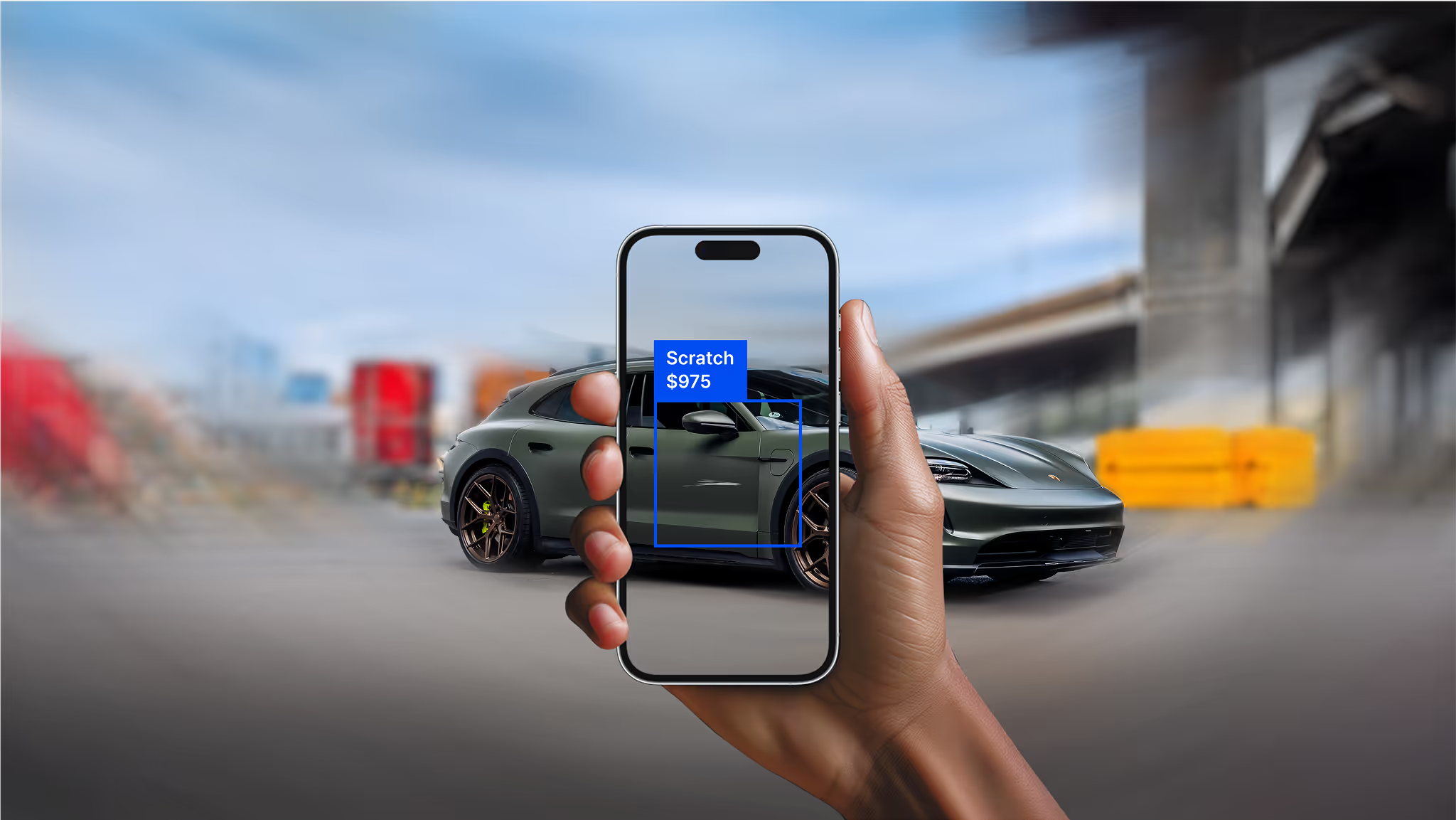Table of contents
Ever purchased a vehicle online only to discover unexpected damage upon delivery? You're not alone.
Online car marketplaces face a significant challenge: building enough buyer confidence to close sales without in-person pre-purchase vehicle inspections. The absence of reliable condition information creates a trust gap that slows transactions and leads to high return rates when reality doesn't match expectations.
Self Inspection's AI-powered marketplace car inspection technology bridges this trust gap by providing transparent, accurate vehicle condition reports that buyers can rely on. As the AI vehicle inspection market continues its rapid expansion, projected to reach $3.5 billion by 2033, forward-thinking marketplace operators are implementing these solutions to accelerate sales cycles and reduce costly returns.
The trust gap in online car marketplaces
Would you spend thousands of dollars on a vehicle you've never seen in person? Most buyers approach online vehicle purchases with understandable skepticism. According to a Linkedin industry research, 70% of potential buyers believe purchasing a pre-owned car online is always a quality risk.
This hesitation stems from several key concerns:
- Limited visual documentation: Standard marketplace listings often feature carefully curated photos that highlight a vehicle's best angles while obscuring potential issues.
- Inconsistent condition descriptions: Seller-provided descriptions vary wildly in detail and accuracy, ranging from thorough to deliberately misleading.
- Hidden mechanical problems: Engine issues, transmission problems, and electrical faults remain invisible in traditional photos.
- Post-purchase disputes: Without clear pre-sale documentation, disagreements about pre-existing damage become common and contentious.
This trust deficit creates a significant barrier to online vehicle transactions. Marketplaces struggle with extended sales cycles as buyers conduct extensive research, seek third-party inspections, or simply abandon purchases altogether due to uncertainty.
Self Inspection's AI-powered marketplace solutions address these concerns by providing comprehensive, standardized condition reports that build buyer confidence through transparency.
The hidden cost of marketplace vehicle returns and disputes
The financial impact of return rates and post-sale disputes extends far beyond simple inconvenience. For online car marketplaces, these issues create substantial operational challenges:
- Direct costs: Transportation expenses for vehicle returns, inspection fees, reconditioning costs, and administrative overhead
- Inventory inefficiency: Returned vehicles create duplicate processing and extended holding periods
- Reputation damage: Each disputed transaction generates negative reviews and damages marketplace credibility
- Customer acquisition waste: Marketing investments are squandered when buyers return vehicles or abandon the platform
By implementing advanced damage detection technology, marketplaces dramatically reduce these costs through accurate pre-sale condition documentation that sets appropriate buyer expectations.

How AI Transforms online vehicle inspections
Traditional vehicle inspections suffer from fundamental limitations that AI technology directly addresses:
Self Inspection's technology transforms this subjective process into an objective science. Our AI analyzes thousands of data points from each vehicle to create standardized, comprehensive condition reports that buyers can trust.
Self Inspection advantage for marketplace car purchases
Online car marketplace success hinges on accurate vehicle condition assessment. Self Inspection delivers unmatched precision through AI algorithms trained on over 10 million annotated vehicle images.
This extensive dataset enables our platform to:
- Detect 6,000+ unique damage types with remarkable consistency.
- Precisely map damage to specific vehicle components.
- Assess severity levels with standardized criteria.
- Document condition with clear visual evidence.
- Provide accurate repair estimates.
Unlike subjective human assessments that vary between inspectors, Self Inspection provides standardized condition reports that buyers and sellers can trust. This standardization eliminates discrepancies that lead to disputes and returns.

Mechanical health insights through OBD2 integration
Exterior appearance tells only half the story. The most expensive disputes in online vehicle sales typically involve hidden mechanical issues that surface after purchase. Self Inspection goes beyond cosmetic assessment by integrating OBD2 diagnostics that reveal:
- Engine performance metrics and fault codes.
- Transmission health indicators.
- Emissions system status.
- Electrical system diagnostics.
- Historical data that might indicate tampering.
These mechanical insights provide crucial valuation factors that photos alone can't capture. By documenting these mechanical conditions before purchase, marketplaces prevent the costly disputes that damage reputation and lead to returns.

Transforming the 18-day sales cycle into 5 days with Self Inspection
The typical online vehicle purchase journey extends over weeks as buyers navigate uncertainty:
- Initial interest in a listing.
- Extended research about potential issues.
- Multiple requests for additional information.
- Third-party inspection arrangement.
- Negotiation based on inspection findings.
- Final decision after extended deliberation.
This prolonged cycle stems from fundamental buyer psychology: without reliable condition information, customers default to skepticism as a self-protection mechanism. Self Inspection's transparent condition reports address this psychology by providing comprehensive documentation upfront.
By proactively answering buyer questions before they're asked, these detailed reports compress the sales timeline dramatically. Verified condition reports satisfy the buyer's need for risk mitigation through:
- Complete damage documentation with visual evidence.
- Expert-verified mechanical health assessment.
- Standardized condition ratings removing subjective opinions.
- Transparent repair estimates establishing clear expectations.

15-minute Self Inspection vs. 45-Minute manual processes
Traditional vehicle inspections create significant marketplace bottlenecks. Consider the time breakdown of conventional methods:
AI inspections reduce processing time from 45+ minutes per vehicle to under 15 minutes. This 3× efficiency improvement creates cascading operational benefits:
- Increased inventory throughput without staffing increases.
- Faster listing publication accelerating time-to-market.
- Simplified seller experience encouraging more listings.
- Enhanced scalability during seasonal volume fluctuations.
For sellers, this efficiency means faster sales and quicker payouts. For marketplaces, it enables more inventory, faster turnover, and improved economics.
View our detailed repair cost projections to understand how these efficiency gains impact your bottom line.

Measuring the ROI of AI vehicle prepurchase inspections
According to McKinsey's State of AI report, 50% of companies use AI-enabled technology in at least one business area. This adoption has led to significant cost savings, with 41% of supply chain management respondents reporting a 10% to 19% cost reduction.
By a similar token, manual vehicle pre-purchase create substantial costs for online marketplaces.
Each returned vehicle incurs:
- Transportation costs: $150-300 for vehicle shipping each way.
- Administrative overhead: 1-2 staff hours at $25-50/hour.
- Reconditioning expenses: $100-$500 for cleaning and inspection.
- Remarketing costs: $50-250 for new photos and promotional placement.
- Extended holding costs: $15-40 per day in carrying costs.
For a marketplace processing 1,000 vehicles monthly with a 25% return rate, these costs can exceed $200,000 monthly. Self Inspection's AI platform typically reduces return rates by up to 45%, translating to potential monthly savings of $90,000 or more.
The combined impact of reduced returns and operational efficiencies typically delivers ROI within 60-90 days of implementation, making AI vehicle inspections one of the highest-return investments available to online marketplaces.

Adding AI vehicle prepurchase inspections to your marketplace
Every online marketplace operates differently, requiring flexible implementation options for AI-powered inspections. Self Inspection offers multiple integration paths to accommodate various business models:
- Full API integration: Connect directly with your existing marketplace platform through comprehensive API documentation to enable seamless data flow between systems.
- White-label solutions: Deploy AI inspections under your own branding, maintaining consistent user experience throughout your marketplace.
- Mobile web solutions: Offer sellers and buyers browser-based inspection capabilities without requiring app downloads.
These integration options work across various marketplace types, from peer-to-peer platforms to dealer-focused exchanges, ensuring your unique operational model benefits from standardized inspection data.
The future of vehicle prepurchase inspections
The vehicle inspection landscape continues to evolve rapidly, with several emerging technologies poised to further enhance capabilities:
- Predictive maintenance insights: AI algorithms will soon analyze OBD2 data to forecast potential failures before they occur, giving buyers unprecedented visibility into future maintenance needs.
- AR/VR integration: Augmented and virtual reality will enable immersive remote inspections, allowing buyers to virtually walk around and interact with vehicles from anywhere.
- Blockchain verification: Immutable blockchain records will create tamper-proof vehicle history logs that follow vehicles through their entire lifecycle.
These advancements represent the next evolution in marketplace trust-building, with Self Inspection leading development in all three areas.

Preparing your marketplace for the AI advantage
To position your platform for success in this evolving landscape:
- Assess your current inspection process by asking:
- How much does each return cost your marketplace?
- What percentage of transactions result in condition disputes?
- How long does your average vehicle take to sell?
- Evaluate AI inspection solutions based on:
- Integration flexibility with your existing platform
- Accuracy metrics and verification processes
- Comprehensiveness of both visual and mechanical assessments
- Consider implementation strategy by determining:
- Which vehicle segments would benefit most from immediate implementation
- What seller incentives would drive adoption
- How you'll measure and communicate success
Ready to explore how AI-powered vehicle inspections can transform your marketplace? Schedule a consultation with our implementation team to discuss your specific needs.


